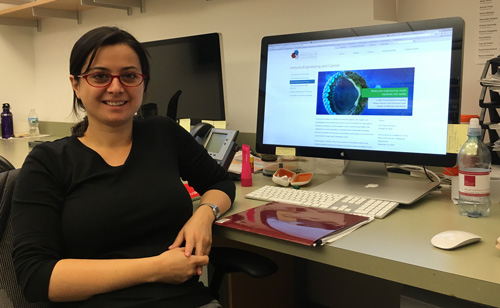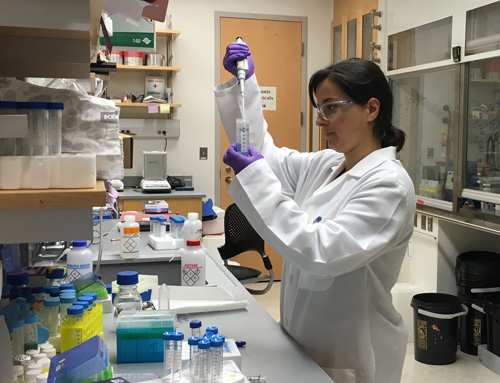Young Scholar Profile: Handan Acar
In every issue of The Bridge, we highlight a young scholar profile from our diaspora. These accomplished and early career individuals demonstrate the potential of next generation Turkish-American scientists and scholars. The young scholar in this issue is Handan Acar, a postdoctoral scholar, at the University of Chicago's Institute of Molecular Engineering.

The Bridge: Would you please tell us about yourself and your journey that led you to become a scientist?
Handan Acar: Honestly, there is no exact time of giving the decision to be scientist in my mind that I can recall. I have been doing whatever I enjoyed and the career came by itself.
As a freshman, I volunteered to work in an electrochemistry lab and I spent my summer and winter breaks for more than 3 years over there. I learnt a lot. The professor that I was working with asked me one day if I wanted to get a master’ s degree with her and I accepted. I think it was the turning point of my career, because the rest was always fun and joyful. I usually forget everything else while I am in the lab, and I think this is the most important thing that helped me to pursue a career as a scientist. I’ve taken science always serious and tried to convince myself, first. Therefore, I can say that being scientist is my life style, rather than my job.
During my PhD, I have visited USA for 2 times for scientific symposiums. I like symposiums a lot, because I like to listen people who know what they are talking about. I have met with many important scientists during those symposiums and I remained in contact with them. After PhD and USA experience, I think my vision enlarged and I decided to work with immunobiology application of the biomaterials. Last year, I came to the University of Chicago to interview with Matthew Tirrell and joined to his group. Now I am working at the Institute for Molecular Engineering and improving my knowledge of immunobiology and cancer. Here is the perfect place to work in this field.
T.B. : Tell us about your research and how it is related to everyday life or other fields.
H.A. : As I already mentioned, my research is based on biomaterial engineering for immunobiology applications. More specifically, I am developing drugs against cancer. There are many different types of cancer and they all have different cell types. Cells are full of proteins, which are useful for inter and intra cell communications. Some abnormalities of the secretion of these proteins can cause immune system problems and cancer. I am trying to correct these abnormalities by inserting part of an important protein into the cell to restore the proper communication between cells. My research is based on designing and synthesizing those tiny parts of such proteins and delivering them into the cells.
Of course, cancer cells can come up with many different abnormalities because of their high mutation rate. Therefore, it is important to study and understand mechanisms of their fast evolution. Another part of my study is based on engineering special scaffolds to identify the ways of communication between cancer and immune cells. This is important to develop better drugs or early diagnosis.
T.B. : What do you consider important to your success ? Tell us about any skills or habits that you think helped you to become a successful scientist at such a young age.
H.A. : Having an “ aims list” ! This is the most important habit I have. It’s not been too long that I ’ve acquired it, but its effect on my success is enormous already. It is very easy, just write them! Have a word document. Write what you want to do in short, medium and long-terms. For example; my long-term aim is to be a successful and well-known scientist in the field of biomaterials in immunobiology applications. My short-term plan is, finishing my current study and publishing it until the end of this year. I am writing what I need to do to finish the current project, which experiments should I do, what am I expecting to learn from those experiments, are they really related to and necessary for my study, etc. I plan these things very carefully not to waste time. Then, I put them all in my calendar. I even write the times that I need to go to the library to read papers or prepare presentations. I book everything, not just meetings, as many people would do.
Another important thing is to keep things focused. For example, whenever I plan a new project, or somebody asks me to collaborate in a project, I always ask myself; is it in accord with my long term plans? Do I have enough time to finish it? These things help me to keep my mind clear. I think we need to have plans even in daily basis, for everything in our lives. Books we want to read, movies we want to see, habits we want to develop. Unfortunately time is limited. We need to learn how to use it very efficiently. It feels like it is a bit too much of planning at the beginning, but I assure you, once you become used to plan your time, it is even relaxing. Knowing what you need to do next prevents unnecessary stress, which can make you unhappy and inefficient. You have to give time to yourself and your beloved ones, too.
T.B. : What are your immediate and long-term goals for the future?
H.A. : I mentioned little bit in the previous question, my long term aim is to be a successful and well known scientist in the field of biomaterials in immunobiology applications. I will start to apply for faculty positions in USA next year. I want to have my own group and lab to do research. I want to teach as well and always to learn. I think the greatest part of being at a university is to be able to audit any class you want and continue learning.
I also want to be useful for my home country. I think I can be more helpful as a successful and strong faculty in my field. I want to visit universities, talk to students and scientists. I hope I can even find opportunities to collaborate with them when I am a faculty. I can help brilliant students to be successful here. I always want to be a scientist that my country is proud of.
T.B. : What do you recommend to aspiring scientists , or to young Turkish scientists who are at the beginning of their careers?
H.A. : The very first thing that I would recommend is to learn English as good as their native language. It is important not only for science, but also to communicate in science. But I do not say that they should forget their own language. I am still very careful about using my own language properly. English is the common language of science and you have to understand other studies, and explain yourself very fluently. It is the number one rule. They should go to English courses, try to read and listen in English, put English into daily life as much as possible. Eventually, they will realize that, being able to communicate in Science is the most important thing to succeed.
I would also strongly recommend reading! Reading about everything scientifically. That would inspire them. They will find a topic that would excite them more than others. Read at least few papers a week. Reading a paper is worth minimum 10 hours in lab. I cannot suggest anything more than that. Of course, being able to understand the things you read is related with degree of your English. So, improving English is again very important.
T.B. : Could you please tell us about your life outside of your work? Do you have hobbies? What are your favorite activities? If you recommend a book, what would that be and why?
H.A. : Yes, I do have hobbies that I enjoyed a lot. I like the History of Art very much. Our country is very wealthy about the historical art.
I would suggest all students, whatever their major is, to go to Europe by inter-rail during their undergrad years. It is not very expensive to travel by trains. It is a wonderful experience, which you should enjoy in early years of your youth. It extends your point of view to all of the history of civilization. Interacting with people from different nations will increase their ability of adaptation. I also would recommend knowing more about Turkish history. I’ m always proud of being Turkish and tell people about our Independence War and Ataturk. If you do not respect your own nation and history, you cannot expect that from others, too.
Another hobby of mine, maybe even a passion, is classical music. I think Turkey is very rich about music. I enjoyed Bilkent Symphony orchestra for many times when I was a grad student over there. Also, I think Cumhurbaskanligi Symphony Orchestra and Borusan are very valuable orchestras. It is again not an expensive hobby with a yearly membership. Chicago Symphony Orchestra is also a great orchestra, but I think Bilkent was better, maybe I am biased here :)
I would recommend two books to read; Malcolm Gladwell; “Outliers” and Antoine de Saint-Exupéry; “The Little Prince”. First one is strongly recommended for people who are looking for something to inspire them to work harder. The second one is a book for everyone at any age. Everybody should read it in every 5-7 years, I think. I always give that as a gift to my friends. I also like to read personal development books. I like to listen audiobooks and podcasts while I am cleaning or cooking. I would recommend that, too.
